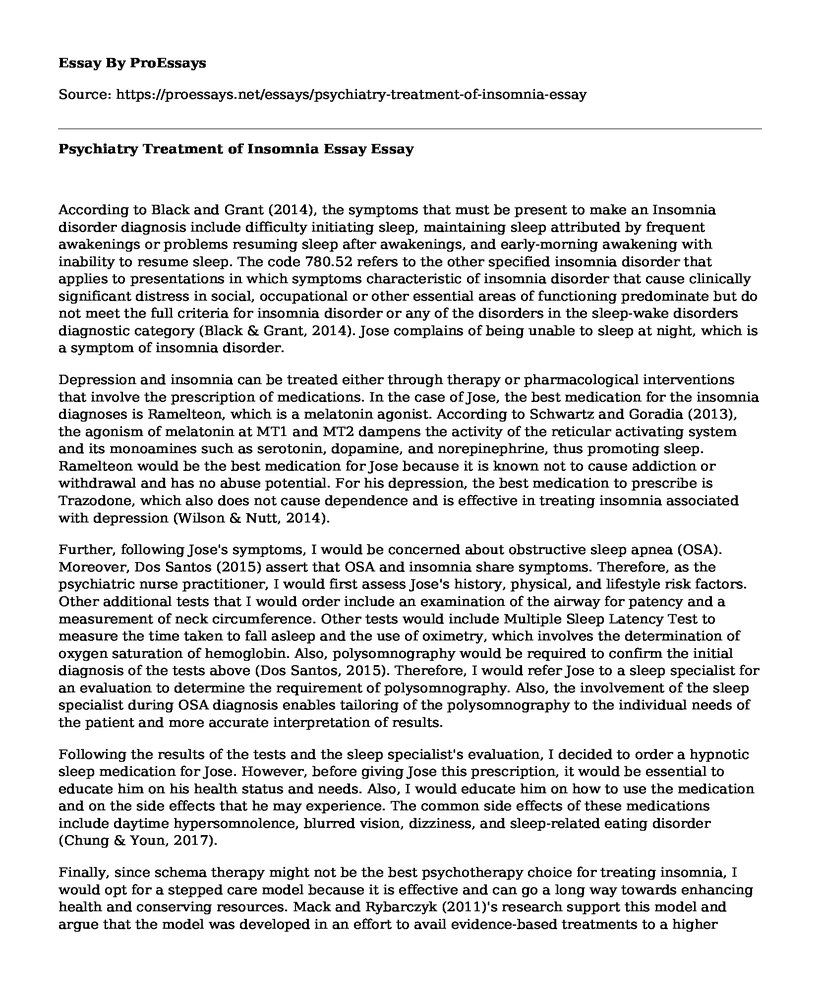According to Black and Grant (2014), the symptoms that must be present to make an Insomnia disorder diagnosis include difficulty initiating sleep, maintaining sleep attributed by frequent awakenings or problems resuming sleep after awakenings, and early-morning awakening with inability to resume sleep. The code 780.52 refers to the other specified insomnia disorder that applies to presentations in which symptoms characteristic of insomnia disorder that cause clinically significant distress in social, occupational or other essential areas of functioning predominate but do not meet the full criteria for insomnia disorder or any of the disorders in the sleep-wake disorders diagnostic category (Black & Grant, 2014). Jose complains of being unable to sleep at night, which is a symptom of insomnia disorder.
Depression and insomnia can be treated either through therapy or pharmacological interventions that involve the prescription of medications. In the case of Jose, the best medication for the insomnia diagnoses is Ramelteon, which is a melatonin agonist. According to Schwartz and Goradia (2013), the agonism of melatonin at MT1 and MT2 dampens the activity of the reticular activating system and its monoamines such as serotonin, dopamine, and norepinephrine, thus promoting sleep. Ramelteon would be the best medication for Jose because it is known not to cause addiction or withdrawal and has no abuse potential. For his depression, the best medication to prescribe is Trazodone, which also does not cause dependence and is effective in treating insomnia associated with depression (Wilson & Nutt, 2014).
Further, following Jose's symptoms, I would be concerned about obstructive sleep apnea (OSA). Moreover, Dos Santos (2015) assert that OSA and insomnia share symptoms. Therefore, as the psychiatric nurse practitioner, I would first assess Jose's history, physical, and lifestyle risk factors. Other additional tests that I would order include an examination of the airway for patency and a measurement of neck circumference. Other tests would include Multiple Sleep Latency Test to measure the time taken to fall asleep and the use of oximetry, which involves the determination of oxygen saturation of hemoglobin. Also, polysomnography would be required to confirm the initial diagnosis of the tests above (Dos Santos, 2015). Therefore, I would refer Jose to a sleep specialist for an evaluation to determine the requirement of polysomnography. Also, the involvement of the sleep specialist during OSA diagnosis enables tailoring of the polysomnography to the individual needs of the patient and more accurate interpretation of results.
Following the results of the tests and the sleep specialist's evaluation, I decided to order a hypnotic sleep medication for Jose. However, before giving Jose this prescription, it would be essential to educate him on his health status and needs. Also, I would educate him on how to use the medication and on the side effects that he may experience. The common side effects of these medications include daytime hypersomnolence, blurred vision, dizziness, and sleep-related eating disorder (Chung & Youn, 2017).
Finally, since schema therapy might not be the best psychotherapy choice for treating insomnia, I would opt for a stepped care model because it is effective and can go a long way towards enhancing health and conserving resources. Mack and Rybarczyk (2011)'s research support this model and argue that the model was developed in an effort to avail evidence-based treatments to a higher number of insomnia patients at lower costs, thus encourage more people to seek treatment for insomnia.
References
Black, D. W., & Grant, J. E. (2014). DSM-5 guidebook: the essential companion to the diagnostic and statistical manual of mental disorders. American Psychiatric Pub.
Chung, S., & Youn, S. (2017). The optimizing strategies for prescription of sleeping pills for insomnia patients. Sleep Medicine Research, 8(1), 8-16.
dos Santos, D. F. F. (2015). Improving diagnosis in obstructive sleep apnea with clinical data: a bayesian network approach.
Mack, L. J., & Rybarczyk, B. D. (2011). Behavioral treatment of insomnia: a proposal for a stepped-care approach to promote public health. Nature and science of sleep, 3, 87.
Schwartz, T. L., & Goradia, V. (2013). Managing insomnia: an overview of insomnia and pharmacologic treatment strategies in use and on the horizon. Drugs in context, 2013.
Wilson, S., & Nutt, D. (2014). Recommended diagnosis and management of insomnia. Prescriber, 25(12), 12-20.
Cite this page
Psychiatry Treatment of Insomnia Essay. (2022, May 09). Retrieved from https://proessays.net/essays/psychiatry-treatment-of-insomnia-essay
If you are the original author of this essay and no longer wish to have it published on the ProEssays website, please click below to request its removal:
- Personality Disorder of Frankie in Frankie and Alice Movie Analysis
- Identification and Evaluation of Normative Leadership Theory Paper Example
- Essay Sample on The Need to Belong: Human Connections for Emotional Wellbeing
- Essay Sample on Components of the Memory System: An In-Depth Analysis
- Essay on Unlock Your Goal-Setting Power: Motivation & Self-Regulation
- Essay Example on Two Shy Lovers: A Slow Burn Romance
- Essay Example on Mental Health Care: Competing Needs & Resources







